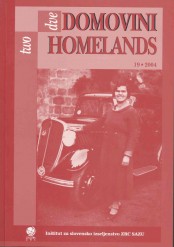Preserving of Ethnic Identity and Heritage among The Slovenian Immigrants and Their Descendants in The United States
Abstract
The text presents different ways of preserving ethnic identity and heritage among Slovenian immigrants and their descendants in the USA from the beginning of the 20th century till now. It presents them through the two intertwind perspectives. The first one describes the social and political circumstances in the USA in the three main periods, in which the Slovenians have immigrated: before the second world war, after it and after 1970. The second perspective is given by the narratives of the Slovenian women or their descendants, in which the practical aspects of the preserving of the ethnic identity or its denial are described. The women narratives were recorded as part of the oral history project, in which more then sixty women of different age, occupation and places participated. One of the most important theme in their stories is the slovenian language and the fact that it was not preserved. To understand, why this could happen so quickly and easily we need to look through the perspective of the social and political conditions in which these women have lived.
The outline of the social conditions in the three periods of Slovenian immigration to the USA first summarizes the ideological pressupositions of the pre-war official rasism. It explaines the nativists' arguments against immigration that started to build momentum at the end of the 19th century and made possible the »quota system bill« in 1924. The scientific rasism that followed was even more devastating and was slowed down only by the attrocities of the Nazis before and during the second world war. The next period, the revival of ethnicity, was born out of the civil right movement and brought a new pride to the ethnic background, culture, food, languages and institutions at the end of the 1960. The conservative counter-attack, which followed the decade later brought an end to the multicultural utopian dreams but it could not destroy the new feeling of the people of different ethnic origin, which made them feel special and good. The brief historical outline of these social changes gives the women's narratives the context, which is for the understanding and feeling of their stories of an utmost importance.
Downloads
Downloads
Published
How to Cite
Issue
Section
License

This work is licensed under a Creative Commons Attribution-NonCommercial-NoDerivatives 4.0 International License.
Authors guarantee that the work is their own original creation and does not infringe any statutory or common-law copyright or any proprietary right of any third party. In case of claims by third parties, authors commit their self to defend the interests of the publisher, and shall cover any potential costs.
More in: Submission chapter





